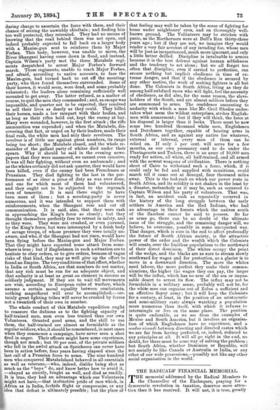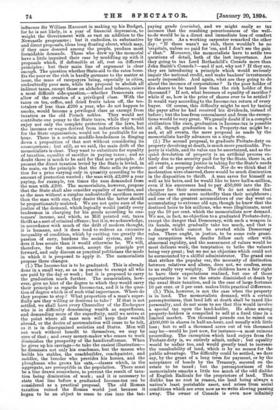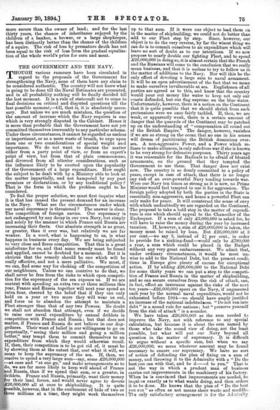THE RADICALS' FINANCIAL MEMORIAL.
THE memorial addressed by the Radical Members to the Chancellor of the Exchequer, praying for a. democratic revolution in taxation, deserves more atten- tion than it has received. It will not, it is true, greatly influence Sir William Harcourt in making up his Budget, for he is not likely, in a year of financial depression, to weight the Government with so vast an addition to the Newcastle programme ; but it embodies, in substantive and direct proposals, ideas long floating about, which may, if they once descend among the people, produce most formidable demands. Those who drew up the memorial have a little impaired their case by muddling up with it proposals which, if defensible at all, rest on different principles ; but their main line of argument is clear enough. The question whether State-aid to the rates bene- fits the poor or the rich is hardly germane to the matter at issue, the mass of ratepayers being, especially in cities, undoubtedly poor men, while the proposal to abolish all indirect taxes, except those on alchohol and tobacco, raises a most difficult side-question,—whether Democrats can allow of the creation of a privileged class. With the taxes on tea, coffee, and dried fruits taken off, the tee- totalers of leas than £200 a year, who do not happen to smoke, would become a privileged class as exempt from taxation as the old French nobles. They would not contribute one penny to the State taxes, while they would enjoy not only the complete protection of the laws, but the incomes or wages derived from industries which, but for the State organisation, would not be profitable for an hour. There is a certain muddle-headedness in flinging down a proposition of that sort without considering its consequences ; but still, as we said, the main drift of the memorialists is clear. They want to substitute for equality of taxation, equality of sacrifice in paying taxes ; and no doubt there is much to be said for that new principle. At present the direct taxation levied by the State is levied, in the main, on the principle that the State sells its protec- tion for a price varying only in quantity according to the amount of protection wanted ; the man with £2,000 a year paying, for example, ten times the sum demanded from the man with £200. The memorialists, however, propose that the State shall also consider equality of sacrifice, and as the man without a surplus undoubtedly sacrifices more than the man with one, they desire that the latter should be proportionately mulcted. We are not quite sure of the justice of the demand, which logically would justify every tradesman in charging for his goods according to cus- tomers' income, and which, as Mill pointed out, taxes thrift as a sort of criminal offence; but it is, we acknowledge, in accordance with much of the drift of modern thought, it is humane, and it does tend to redress an excessive inequality of condition, which by exciting too greatly the passion of envy, burdens the social system, and ren- ders it less secure than it would otherwise be. We will, therefore, for the moment, accept the principle put forward, and only discuss as practical politicians the mode in which it is proposed to apply it. The memorialists propose three changes. (1.) The Income-tax is to be graduated. This is already done in a small way, so as in practice to exempt all who are paid by the day or week ; but it is proposed to carry the graduation much further. The memorialists, how- ever, give no hint of the degree to which they would carry their principle as regards Income-tax, and it is the ques- tion of degree which is of such vital importance. Where do they propose to stop ? What proportion of a man's super- fluity are they willing or desirous to take ? If that is not settled, we shall have every Chancellor of the Exchequer who is in difficulty denouncing wealth as superfluous, and demanding more of the superfluity, until we arrive at the point where all sane men will keep their wealth abroad, or the desire of accumulation will cease to be felt, as it is in disorganised societies and States. Men will not work without benefit to themselves, we may be sure of that ; and every money-maker who ceases to work diminishes the prosperity of the handicraftsman. When he gives up his carriage—to take the easiest illustration— he dismisses not only his coachman, but the mason who builds his stables, the coachbuilder, coachpainter, and saddler, the breeder who provides his horses, and the ploughman who grows his oats,—classes which, in the aggregate, are perceptible in the population. There must be a line drawn somewhere, to prevent the result of taxa- tion being diminution of work ; and it is necessary to state that line before a graduated Income-tax can be considered as a practical proposal. The old Roman taxation ruined the Roman world just because it began to be an object to cease to rise into the tax- paying grade (curiales), and we might easily so tax incomes that the resulting • penuriousness of the well- to-do would be in a direct and immediate loss of comfort by the poor. As a working carpenter remarked the other day : " If there warn't no rich, there wouldn't be no 'orspitals, unless we paid for 'em, and I don't see the gain o' that." Moreover, the memorialists have to settle two questions of detail, both of the last importance. Are they going to tax Lord Rothschild's Consols more than John Smith's Consols ?—and if not, why not ? If they are, they are introducing a principle which would seriously impair the national credit, and make bankers' investments nearly impossible. And again, what are they going to do about the incomes of corporations ? Is the poor holder of five shares to be taxed less than the rich holder of five thousand ? If not, what becomes of equality of sacrifice ? while if so, how is the price of shares ever to be settled ? It would vary according to the Income-tax return of every buyer. Of course, this difficulty might be met by taxing the payer after he had received his dividends, instead of before ; but the loss from concealment and from the exemp- tions would be very great. We greatly doubt if in a complex civilisation like ours, graduation in Income-tax is possible at all, though graduation in a Property-tax might be ; and, at all events, the mere proposal as made by the memorialists hardly advances us a single step. (2.) The second proposal, to graduate Probate-duty on. property devolving at death, is much more practicable. Pro- perty is visible, and its value can be ascertained, and as the quiet devolution of property is an artificial process en- tirely due to the security paid for by the State, there is, at all events, a seeming justice in taking for the State's needs part of the property devolved. Nor do we think that if moderation were observed, there would be much diminution in the disposition to thrift. A man saves for himself as well as his heirs, and he would like to have half-a-million, even if his successors had to pay £50,000 into the Ex- chequer for their succession. We do not notice that childless men are more unthrifty than their neighbours ; and one of the greatest accumulators of our day went on accumulating to extreme old age, though he knew that the destined heirs to his millions, who were illegitimate, must pay the 10 per cent, which the memorialists now demand. We see, in fact, no objection to a graduated Probate-duty, except the danger that Democracy, with such a weapon in its hands, might gradually take too much, and that is a danger which cannot be averted while Democraey rules. There ought, in justice, to be some rule grant- ing exemptions when deaths follow each other with abnormal rapidity, and the assessment of values would be most delicate work, the temptation to bribe the valuers being very great ; but we see no objection which could not be surmounted by a skilful administrator. The grand one that strikes the popular ear, the necessity of distinotion between relatives and aliens, does not, we confess, seem to us really very weighty. The children. have a fair right to have their expectations realised, but one of those expectations is to see the estate diminished at death by the usual State taxation, and in the case of large fortunes 10 per cent. or 3 per cent, makes little practical difference.
(3.) This, however, is not the case when the property is in land. The memorialists demand, with a certain peremptoriness, that land left at death shall be taxed like personalty, and do not seem to see that this would involve a Special tax upon the land-holder. He alone among property-holders is compelled to sell at a fixed time in a limited market. Ten thousand pounds can be raised on £100,000 in shares in half-an-hour, and usually with little loss ; but to sell a thousand acres out of ten thousand may be—would be just now, for instance—a most ruinous proceeding. The exemption which land enjoys from the Probate-duty is, we entirely admit, unfair ; but equality would be unfair too, and would greatly tend to increase the unsaleability of land, which is by no means for the public advantage. The difficulty could be settled, we dare say, by the grant of a long term for payment, or by the acceptance of bonds by the Treasury, secured on the estate to be taxed ; but the peremptoriness of the memorialists smacks a little too much of the odd dislike of English Radicals for the proprietors of land. That dislike has no root in reason, the land being always a nation's least perishable asset, and arises from social conditions which are even now as we write slowing passing away. The owner of Consols is even now infinitely more secure than the owner of land; and for the last thirty years, the chance of inheritance enjoyed by the children of a banker, a, brewer, or a large shopkeeper, has been distinctly better than the chance of the children of a squire. Tbe risk of loss by premature death has not been equal to the risk of loss from the gradual equalisa- tion of the whole world's price for corn and meat.




































 Previous page
Previous page